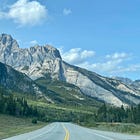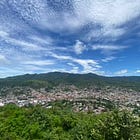Canada: A Proud Nation, Not a Footnote in America’s Story
Dear U.S.A., we love you—but we're not you.
Some days you just have to rant, and that’s where I’m at this week. For years, we’ve laughed off that so many Americans can’t find Canada on a map, how they assume we all live in igloos, how they think we’d be better off as their ‘51st state.’ It was funny—until it wasn’t.
We’ve spent years assuming that being ‘good neighbours’ was enough; our shared history, culture, and values spoke for themselves. (I’m keeping the u in "neighbours, dammit. I’ve been a writer for over 20 years and am well-versed in American and the Queen’s English. But let’s be clear—we’re a separate country.)
For those of us who have spent time on both sides of the Canada-U.S. border, the current political tensions feel particularly surreal. We’ve long enjoyed one of the most successful and mutually beneficial relationships in the world. Our economies are deeply intertwined, our cultures overlap in countless ways, and our citizens move between our countries with ease, whether for work, travel, or the occasional pilgrimage to stock up on cheaper dairy and gasoline.
Canada isn’t just America’s quieter, politer cousin. We are a country built on different values—ones that prioritize social safety nets, multiculturalism, and diplomacy over bravado. Our identity isn’t a quieter reflection of our neighbours to the south. We don’t measure ourselves against America, because we were never meant to be the same.
We have two official languages, a healthcare system that puts people before profit (this is becoming debatable, but we won’t go there today), and a reputation on the world stage that has been shaped by peacekeeping, not power plays. We are our own nation.
And yet, here we are. There are accusations flying about crime and trade, and even the absurd threat that Canada could be annexed as the 51st state. It’s the kind of rhetoric that sounds more like a bad satire than a serious political discussion, yet somehow, it’s making headlines.
Anyway, listen… I can’t believe I even have to say this out loud, but here goes:
Canada is not an extension of the United States.
We are not a lost little sibling waiting for a reunion. We’re not a burden, a dependent, or a desperate ex watching longingly from across the border.
Canada is a nation in our own right, with our own identity, values, and history. We’re proud of our friendship with the U.S., but let’s be clear—we are not the same.
This moment is unsettling for many Canadians. We’ve grown up with the quiet confidence that our borders are stable, our alliances secure, and our national identity unquestioned. The idea that any of that could be thrown into doubt feels almost surreal.
I have deep respect for those around the world who have lived their entire lives under the threat of shifting borders and power dynamics. I met a woman last year in Croatia who told me that, despite never moving, her country of residency had changed four times in her lifetime.
As a Canadian, that seems almost unfathomable. And it makes me wonder—if stability and longevity as a nation aren’t part of what makes North American countries “great,” then what exactly are we bragging about to the rest of the world?
I love my American friends, colleagues, and clients. Our two nations have built one of the strongest partnerships in modern history; one rooted in mutual respect, not dependency. And if there’s one thing travel has taught me, it’s that respect is what truly matters.
That respect is being undermined in inestimable ways.
This suggestion that we’re somehow subsidized by the U.S. is truly incredible. If we’re being honest with one another, Canada has bailed out our delinquent sibling more times than we can count. We may not be the loudest voice in the room, but when the U.S. has needed us, we’ve always been there. We don’t hold it over their heads, we don’t demand a parade, and we certainly don’t ask for repayment.
When American diplomats were trapped in Tehran during the 1979 revolution, it was Canada that orchestrated their escape, hiding them in our embassy and smuggling them out as our own. In the wake of 9/11, when U.S. airspace shut down, it was Canada (particularly the people of Newfoundland) who opened their homes to stranded Americans, feeding them, sheltering them, treating them like family. Many more of us headed to New York to help.
When Hurricane Katrina devastated the Gulf Coast, Canadian search-and-rescue teams were on the ground before FEMA had even figured out its response plan. When wildfires raged in the West, Canadian water bombers crossed the border without hesitation. We even continued to stand by you when four Canadian soldiers were killed and eight injured by “friendly fire” from an American pilot in Afghanistan.
From the Underground Railroad to space exploration, from world wars to pandemic responses, Canada has consistently been a steadfast ally, quietly and selflessly supporting the United States through diplomatic, military, humanitarian, and technological challenges without ever seeking credit or demanding recognition.
When the U.S. needs help, Canada shows up.
Not because we have to, but because that’s what good neighbours do. Because we love you guys. Most of you, anyway.
We’ve played along with the jokes for years… smiling politely when Americans act surprised that we have big cities, rolling our eyes when they think our biggest contribution to pop culture is poutine. Haha, I live in an igloo. Haha, I left my dogsled parked outside.
We let them believe that Canada is just a quieter, colder version of the U.S. because correcting them felt like more effort than it was worth.
But when ignorance turns into dismissal, and dismissal turns into disrespect, it stops being harmless. It stops being funny. And it starts to matter.
This talk of Canada as a burden—of annexation, of tariffs meant to punish us, as though we haven’t spent centuries standing shoulder-to-shoulder—it’s not just absurd. It’s insulting.
Most Americans I’ve met don’t think of their northern neighbours as anything but allies and friends. Traveling through Europe, I’ve seen American strangers light up at the sight of my maple leaf pin. In California, I’ve been met with stories about that time they went to Banff or how much they love Vancouver. In New York, I’ve been welcomed like family.
There is a warmth between our people that politics cannot erase. But that warmth, that history, does not mean Canada is sitting at the window, breathlessly waiting for America’s approval of us.
The rhetoric coming from certain corners of the U.S. right now isn’t just chest-thumping nationalism—it’s reckless. It’s breaking something fragile: trust. And trust, once broken, doesn’t simply reset with a new administration.
Canada is patient, but we’re not naive. We see what’s happening. The U.S. isn’t just dividing itself; there are those who would benefit from dividing us, too. They’d have us believe that our friendship is conditional, and that our long-standing alliance is a favour, not a partnership.
So let’s be clear: Canada isn’t America’s understudy, its polite northern twin, or an extension of its borders. We are not a footnote in America’s story.
Canadians have always shown up for our American neighbours. Not out of obligation, but out of shared values, out of respect, out of something deeper than politics. And when the dust settles, when the fear-mongering fades, that’s what will remain: the people, the relationships, the history we’ve built together.
We will never be another state… in fact, the States of America should be looking inward now and reflecting on how to honour the “United” part of their moniker before thinking of dragging any unwilling neighbours into the fray.
We stand on guard, even against those we never thought we’d have to.
You might also like:






